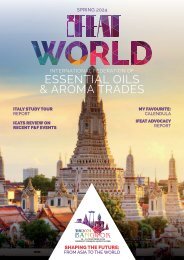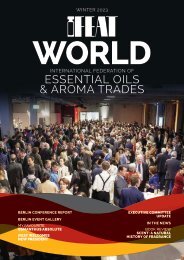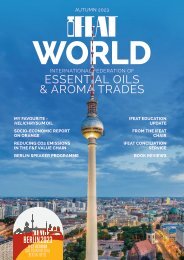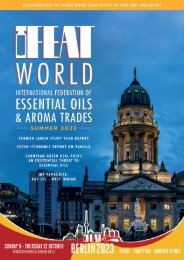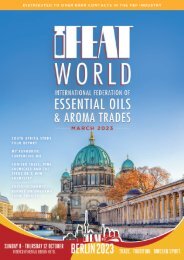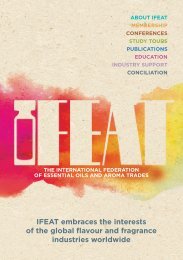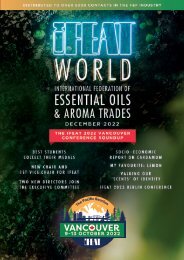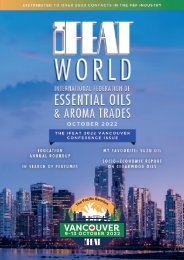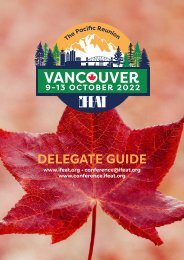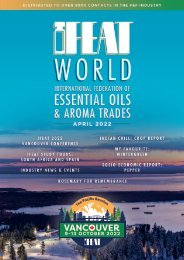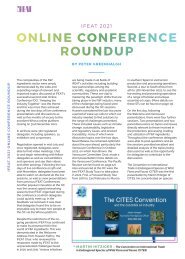IFEATWORLD July 2022
A Members' Newsletter for the International Federation of Essential Oils & Aroma Trades.
A Members' Newsletter for the International Federation of Essential Oils & Aroma Trades.
You also want an ePaper? Increase the reach of your titles
YUMPU automatically turns print PDFs into web optimized ePapers that Google loves.
26<br />
WORLD<br />
F&F INGREDIENTS: A CHANGING MARKET<br />
VENUE OF OTHER<br />
MARKETS AND<br />
PRINCIPLE OF GREEN<br />
GRAVITATION<br />
F&F ingredients are often sourced<br />
from co-products and by-products<br />
traditionally sourced from other<br />
industries, a system that has been<br />
relatively stable for the past 50<br />
years. However, each industry is<br />
now looking for more renewable<br />
solutions, driven by consumer<br />
demand for greener and cleaner<br />
products. This means that those<br />
industries might feel more obliged to<br />
keep and recycle their own organic<br />
waste, in particular, their waste of<br />
renewable substances. A rough<br />
estimate of some other industries’<br />
hydrocarbon consumption (in MT per<br />
annum) is a good exercise to predict<br />
new demand flows on renewable<br />
hydrocarbons (Figure 3 on page 23):<br />
• Thermoplastic industry: requiring<br />
400 million MT of hydrocarbons,<br />
currently almost exclusively from<br />
fossil feedstock (and recycling<br />
less than 100 million MT each<br />
year). What will be the impact if<br />
thermoplastic industries were to<br />
add some renewable carbons to<br />
their feedstock? The thermoplastic<br />
industry would need three million<br />
tonnes of hydrocarbons to achieve<br />
1% of increased renewability.<br />
• Pesticides: possibly need 50 million<br />
MT of hydrocarbons; there is a big<br />
push for renewable feedstock such<br />
as turpentine derivatives as<br />
building blocks for new green<br />
agrochemicals.<br />
available green hydrocarbons. One<br />
might probably see new applications<br />
for renewable and natural materials.<br />
In conclusion, the many F&F<br />
ingredients constitute a complex<br />
universe, undergoing a big evolution<br />
due to its interdependence on other<br />
industries, regulations and, finally,<br />
climate change. The quest for more<br />
renewable materials across industries<br />
will accelerate the evolution of F&F<br />
value chains. In order to preserve<br />
supply continuity and respond to the<br />
demand for more green products,<br />
companies will need to think out of<br />
the box, or - pun intended - think out<br />
of the bottle!<br />
ACKNOWLEDGEMENTS<br />
I would like to thank several<br />
colleagues from the IFEAT Scientific<br />
Committee: Mr. Kim Bleimann, Dr.<br />
Jonathan Bonello, Mr. Ramon Bordas,<br />
Dr. Wladyslaw Brud, Mr. Hussein<br />
Fakhry, Dr. Peter Greenhalgh and Mr.<br />
Geemon Korah, as well as Mrs. Tina<br />
Hotchin, Mrs. Véronique Louis and<br />
Mr. Wolfram Ridder, for their valuable<br />
contributions and support in proofreading<br />
this article.<br />
ABOUT THE AUTHOR<br />
Alain Frix dedicated 30 years to the<br />
business of renewable materials,<br />
from forest products such as<br />
turpentine and its perfumery<br />
derivatives to aromatic plants and<br />
essential oils.<br />
After chairing the International<br />
Federation of Essential Oils and<br />
Aroma Trades (IFEAT) for several<br />
years, he currently chairs IFEAT’s<br />
Scientific Committee and is involved<br />
in various projects related to aromatic<br />
plants, biodiversity and climate<br />
change. He is also a member of other<br />
prestigious associations such as SFP<br />
(Société Française des Parfumeurs)<br />
France; PCA (Pine Chemicals<br />
Association) USA (forestry derivatives<br />
from conifer biomass); SEPAWA<br />
(Europe’s widest association for Soap,<br />
Perfumery, Detergent and Cleaners),<br />
Germany; DGP (German Society<br />
of Perfumers) Germany; VALBIOM<br />
(Biomass valorization), Belgium.<br />
Alain Frix founded his consultancy<br />
company, Allchemix BV, in 2020. He<br />
has a master’s degrees in biology and<br />
in management.<br />
Alain is one of the speakers at the<br />
IFEAT <strong>2022</strong> Vancouver Conference<br />
and will speak on the subject of<br />
F&F Feedstocks & Renewability.<br />
His presentation will take place<br />
on Monday 10th October during<br />
the morning session at the Westin<br />
Bayshore Hotel.<br />
Alain Frix<br />
Founder Allchemix BV Consultancy<br />
alain.frix@allchemix.com<br />
S<br />
• Laundry/detergents: possibly need<br />
30 million MT of hydrocarbons.<br />
• Cosmetics: could require up to<br />
4 million MT of hydrocarbons.<br />
This is not to forget other industries<br />
which will also compete with<br />
renewable feedstock, including<br />
energy, pharma, textile, automotive,<br />
coating, printing, and electronics<br />
beyond the growing sector of<br />
traditional biomass uses, such<br />
as lumber for construction and<br />
homebuilding.<br />
These estimations are meant to<br />
illustrate that size does matter.<br />
As a result, there will be a “green<br />
gravitation,” with the strongest<br />
market keeping and/or attracting the




